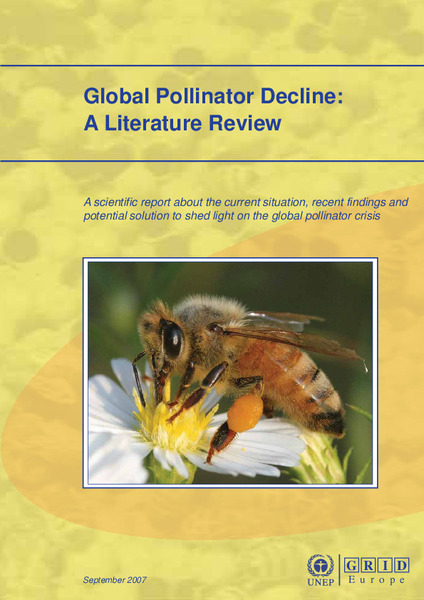Global Pollinator Decline: A Literature Review - A scientific Report about the Current Situation, Recent Findings and Potential Solution to Shed Light on the Global Pollinator Crisis
| dc.contributor | Science Division | en_US |
| dc.contributor.author | Kluser, S. | en_US |
| dc.contributor.author | Peduzzi, Pascal | en_US |
| dc.coverage.spatial | Global | en_US |
| dc.date.accessioned | 2022-10-24T09:01:36Z | |
| dc.date.available | 2022-10-24T09:01:36Z | |
| dc.date.issued | 2007 | |
| dc.identifier.uri | https://wedocs.unep.org/20.500.11822/40959 | |
| dc.description | We are currently enduring the 6th mass extinction, losing between 1 - 10 % of biodiversity per decade, mostly as a result of habitat loss, pest invasion (exotics), pollution, over harvesting and disease. Why care? Biodiversity losses aren’t only affecting natural ecosystems but also the services they provided and some of them are vital for human societies amongst other the presence of oxygen into the atmosphere, renewing of soils (from bacteria, worms, …) and pollination – the transfer of pollen from one flower to another – is critical to fruit and seed production, and is often provided by insects and other animals on the hunt for nectar, pollen or other floral rewards. | en_US |
| dc.format | Text | en_US |
| dc.language | English | en_US |
| dc.publisher | United Nations Environment Programme | en_US |
| dc.rights | Public | en_US |
| dc.subject | pollen | en_US |
| dc.subject | apiculture | en_US |
| dc.title | Global Pollinator Decline: A Literature Review - A scientific Report about the Current Situation, Recent Findings and Potential Solution to Shed Light on the Global Pollinator Crisis | en_US |
| wd.identifier.sdg | SDG 15 - Life on Land | en_US |
| wd.topics | Nature Action | en_US |
| wd.identifier.pagesnumber | 12 p. | en_US |


